外研版(2019)必修第二册Unit 2 Let's Celebrate! Using language 情态动词课件 (共19张PPT)
文档属性
| 名称 | 外研版(2019)必修第二册Unit 2 Let's Celebrate! Using language 情态动词课件 (共19张PPT) |

|
|
| 格式 | pptx | ||
| 文件大小 | 1.5MB | ||
| 资源类型 | 教案 | ||
| 版本资源 | 外研版(2019) | ||
| 科目 | 英语 | ||
| 更新时间 | 2023-07-25 17:42:27 | ||
图片预览

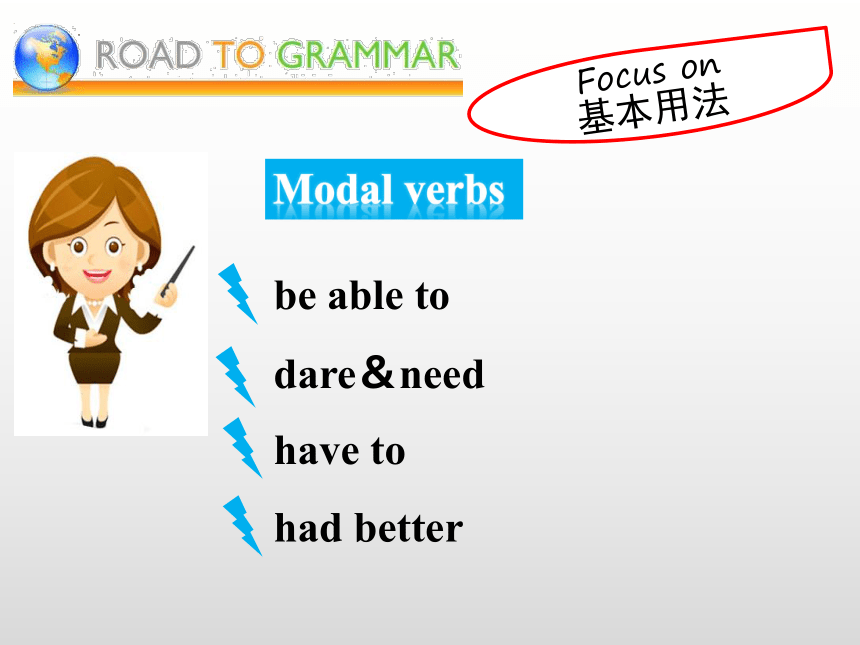
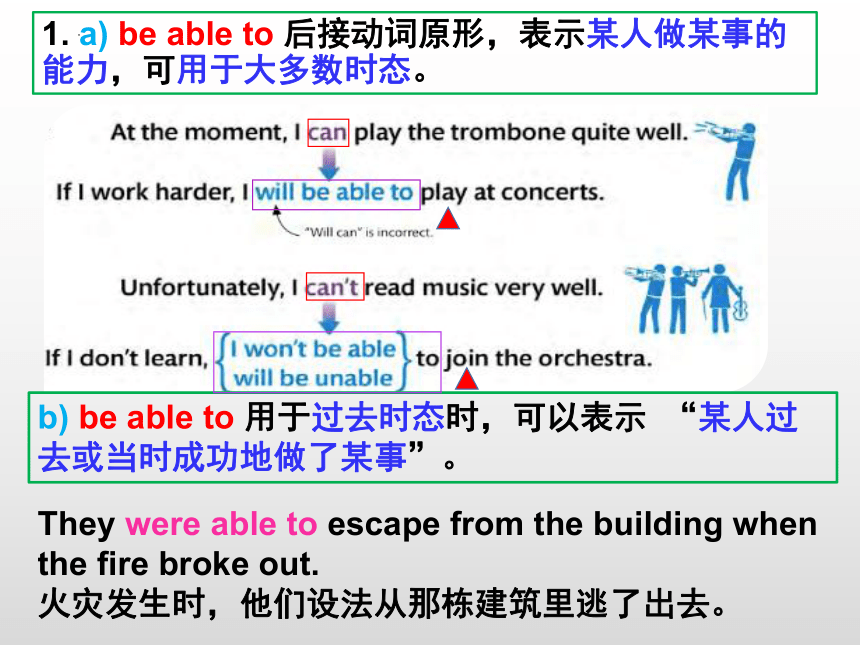
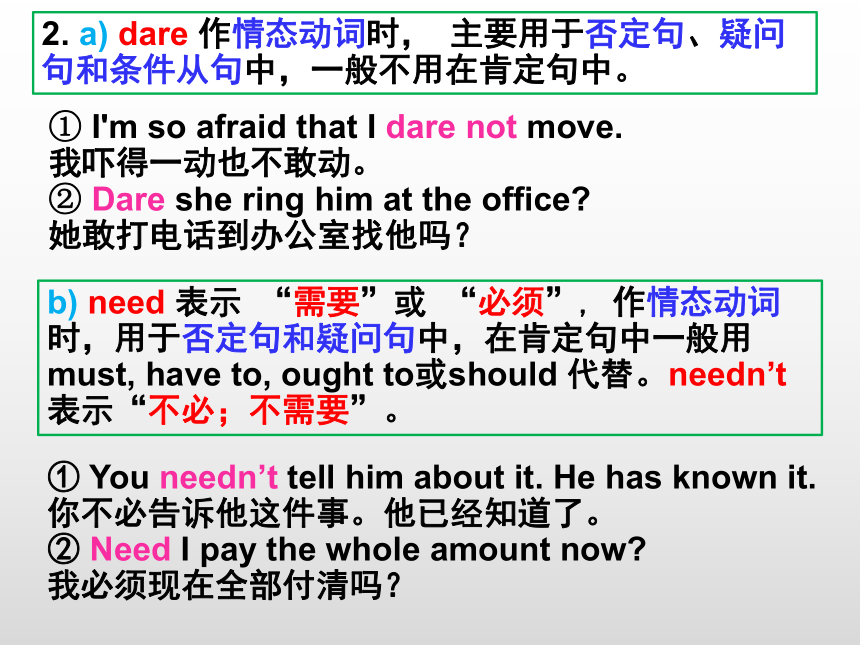
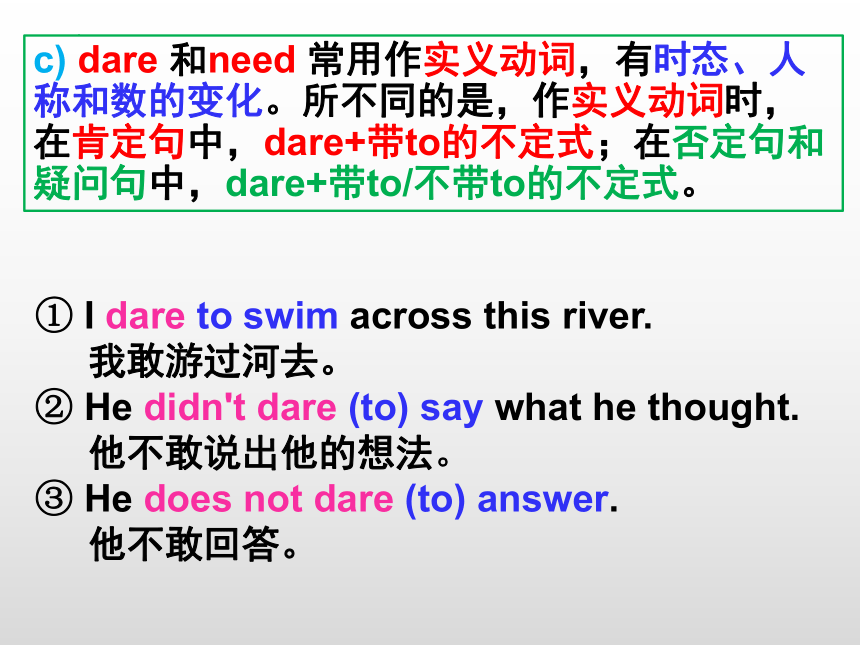
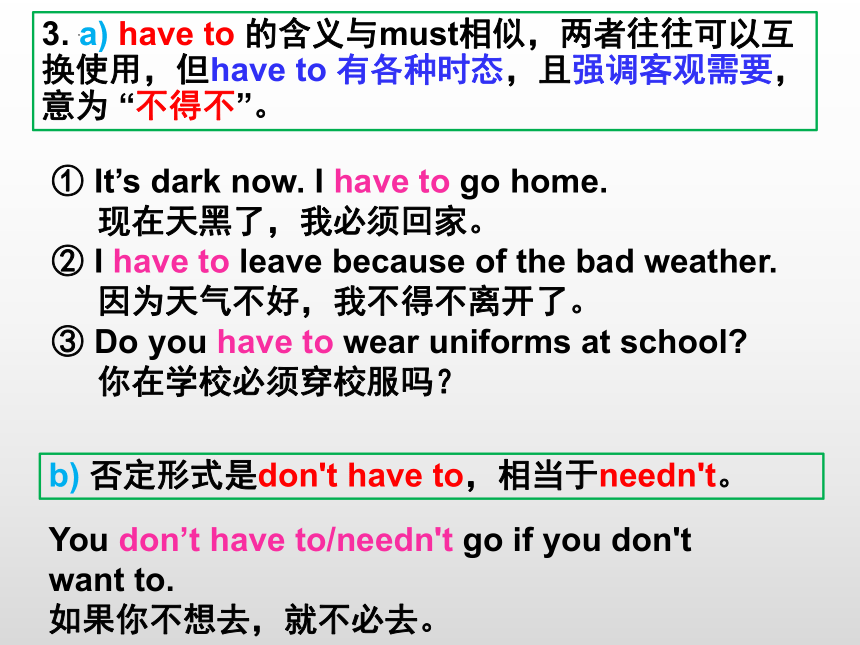
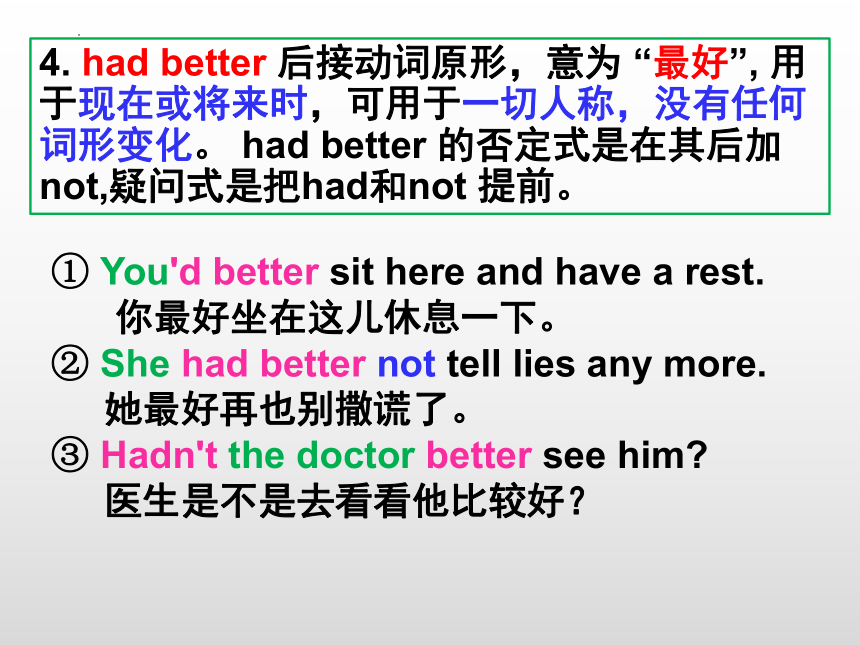
文档简介
(共19张PPT)
情态动词
Focus on
基本用法
Modal verbs
be able to
dare&need
have to
had better
1. a) be able to 后接动词原形,表示某人做某事的能力,可用于大多数时态。
They were able to escape from the building when the fire broke out.
火灾发生时,他们设法从那栋建筑里逃了出去。
b) be able to 用于过去时态时,可以表示 “某人过去或当时成功地做了某事”。
2. a) dare 作情态动词时, 主要用于否定句、疑问句和条件从句中,一般不用在肯定句中。
① I'm so afraid that I dare not move.
我吓得一动也不敢动。
② Dare she ring him at the office
她敢打电话到办公室找他吗?
b) need 表示 “需要”或 “必须”, 作情态动词时,用于否定句和疑问句中,在肯定句中一般用must, have to, ought to或should 代替。needn’t表示“不必;不需要”。
① You needn’t tell him about it. He has known it.
你不必告诉他这件事。他已经知道了。
② Need I pay the whole amount now
我必须现在全部付清吗?
c) dare 和need 常用作实义动词,有时态、人称和数的变化。所不同的是,作实义动词时,在肯定句中,dare+带to的不定式;在否定句和疑问句中,dare+带to/不带to的不定式。
① I dare to swim across this river.
我敢游过河去。
② He didn't dare (to) say what he thought.
他不敢说出他的想法。
③ He does not dare (to) answer.
他不敢回答。
3. a) have to 的含义与must相似,两者往往可以互换使用,但have to 有各种时态,且强调客观需要,意为 “不得不”。
① It’s dark now. I have to go home.
现在天黑了,我必须回家。
② I have to leave because of the bad weather.
因为天气不好,我不得不离开了。
③ Do you have to wear uniforms at school
你在学校必须穿校服吗?
You don’t have to/needn't go if you don't want to.
如果你不想去,就不必去。
b) 否定形式是don't have to,相当于needn't。
4. had better 后接动词原形,意为 “最好”, 用于现在或将来时,可用于一切人称,没有任何词形变化。 had better 的否定式是在其后加not,疑问式是把had和not 提前。
① You'd better sit here and have a rest.
你最好坐在这儿休息一下。
② She had better not tell lies any more.
她最好再也别撒谎了。
③ Hadn't the doctor better see him
医生是不是去看看他比较好?
I. 用适当的情态动词填空,每空一词。
1. You __________ go to school tomorrow, because
it is Saturday.
2. I'm afraid of dark, so I _______ _______ go out alone at night.
3. Although the driver was badly hurt, he __________ ________ ________ explain what had happened.
4. It is raining heavily outside. You _______ _____ not go out now.
5. The Wangs had planned a trip to Hainan, but
because of the heavy rain, they _______ _______ stay at home instead.
needn’t
dare not
was
able to
had better
had to
II.根据汉语提示完成下列对话,每空一词。
1. — What do you think of his advice
— It couldn't be better. You ______ ______ ______ ______ _______ (最好接受他的建议).
2. — Jim, how _______ _______ _______ _______
(你怎敢说那话) to your boss
— So what He's always treating us unfairly.
3. — The concert was wonderful last night. Did you
go to it
— No. I would like to have, but I ____ ______
________ ________ (不得不照顾) my sick
baby at home.
had better
take his advice
dare you say that
had to
look after
4. — Last year, we ______ ______ ______ _____
(能给) presents to each of the 80 children at
a school in our community, and throw a
Christmas party for them. This year our goal
is to add at least 20 children.
— Well done!
5. — I will give a call to Mrs. Brown to tell her the
news.
— You ________ _________ (没必要打电话)
her because she has already known it.
were able to give
needn't phone/call
Focus on
基本用法
情态动词must, can, could, may, might等都有表推测的用法,都可以对过去,现在或将来的情况是否发生做出语气强弱不同的推测。
情态动词表推测
1. 在肯定句中表推测:
(1) You must tell me all about your new friend.
根据推测语气的强弱,选择情态动词。
(2) He could be at home.
He may be at home.
He might be at home.
你必须告诉我有关你新朋友的一切。
他可能在家。
could, may, might语气依次减弱,表示“可能, 也许”。
must语气最强, 表示“肯定,一定”;
(非常肯定)
(很可能)
(仅仅可能而已)
(或许, 非常不确定)
2. 在否定句中表推测:
(1) It can't snow in summer.
may/might not语气较弱,表示“可能不”;
mustn’t表示“禁止”,不用于否定推测。
我们可能哪里也去不成。
(2) We might not go anywhere.
You mustn't tell a lie to parents.
夏天不可能下雪。
你不能对父母说谎。
can’t, couldn’t语气较强,表示“不可能”;
3. 在疑问句中表推测:
(1) Could he have finished the task
他可能把任务完成了吗?
(2) Can he be at home now
他现在能在家吗?
(语气较为委婉,可能性较小)
(语气较强)
疑问句中用can/could(能……?),could语气更加委婉不确定。
1.“情态动词+be/be doing/动词原形”表达对现在情况或此时此刻正在发生的事情的推测。
(3) He must work very hard.
(= I'm sure he generally works very hard.)
他一定工作很努力。
(2) They may not be having fun.
(= I don't think they are having fun.)
他们可能并不开心。
(1) He can't be at home at this time.
(= I don't think he is at home at this time.)
这个时候他不可能在家。
情态动词表推测的三种时态。
2.“情态动词+have +V-ed”表达对过去情况的推测。
(1) They may/might have got lost.
他们可能迷路了。
(2) Emma must have been very upset.
他不可能走的这么早。
(3) He can't have left so soon.
(4) You could have helped me, but why did you just sit and watch
艾玛一定很难过。
你本来可以帮助我的,为什么只坐在一旁瞧着?
may/might have done 可能做了某事
must have done
一定做了某事
can't have done
不可能做了某事
could have done
本来可以做某事(却没做)
3.“情态动词+动词原形”表达对将来情况的推测。
(1) She must arrive before 5.
(= I'm sure she will arrive before 5.)
5:00前她一定到。
(2) She may walk miles and miles among the hills without meeting anyone.
(= It's probable that she walk miles and miles among the hills without meeting anyone. )
她可能会在山里一连走好几英里都遇不到一个人。
情态动词表推测时的反意疑问句、 附加疑问句部分一般不再用情态动词表示推测语气。而是根据情态动词之后的动词及时间状语或上下文确定具体形式。
(1) That girl must be your sister, isn’t she
(2) He must have left yesterday, didn’t he
那个女孩一定是你的妹妹,是吗
他昨天一定走了,是吗
Grammar
Focus
情态动词
表推测
三种时态
过去
现在
情态动词+have+V-ed
情态动词+be/be doing/动词原形
将来
情态动词+动词原形
根据语气强弱选择
肯定句
否定句
must最强
can't, couldn't最强
could, may, might依次减弱
may/might not较弱
can语气较强
could语气更加委婉不确定
疑问句
情态动词
Focus on
基本用法
Modal verbs
be able to
dare&need
have to
had better
1. a) be able to 后接动词原形,表示某人做某事的能力,可用于大多数时态。
They were able to escape from the building when the fire broke out.
火灾发生时,他们设法从那栋建筑里逃了出去。
b) be able to 用于过去时态时,可以表示 “某人过去或当时成功地做了某事”。
2. a) dare 作情态动词时, 主要用于否定句、疑问句和条件从句中,一般不用在肯定句中。
① I'm so afraid that I dare not move.
我吓得一动也不敢动。
② Dare she ring him at the office
她敢打电话到办公室找他吗?
b) need 表示 “需要”或 “必须”, 作情态动词时,用于否定句和疑问句中,在肯定句中一般用must, have to, ought to或should 代替。needn’t表示“不必;不需要”。
① You needn’t tell him about it. He has known it.
你不必告诉他这件事。他已经知道了。
② Need I pay the whole amount now
我必须现在全部付清吗?
c) dare 和need 常用作实义动词,有时态、人称和数的变化。所不同的是,作实义动词时,在肯定句中,dare+带to的不定式;在否定句和疑问句中,dare+带to/不带to的不定式。
① I dare to swim across this river.
我敢游过河去。
② He didn't dare (to) say what he thought.
他不敢说出他的想法。
③ He does not dare (to) answer.
他不敢回答。
3. a) have to 的含义与must相似,两者往往可以互换使用,但have to 有各种时态,且强调客观需要,意为 “不得不”。
① It’s dark now. I have to go home.
现在天黑了,我必须回家。
② I have to leave because of the bad weather.
因为天气不好,我不得不离开了。
③ Do you have to wear uniforms at school
你在学校必须穿校服吗?
You don’t have to/needn't go if you don't want to.
如果你不想去,就不必去。
b) 否定形式是don't have to,相当于needn't。
4. had better 后接动词原形,意为 “最好”, 用于现在或将来时,可用于一切人称,没有任何词形变化。 had better 的否定式是在其后加not,疑问式是把had和not 提前。
① You'd better sit here and have a rest.
你最好坐在这儿休息一下。
② She had better not tell lies any more.
她最好再也别撒谎了。
③ Hadn't the doctor better see him
医生是不是去看看他比较好?
I. 用适当的情态动词填空,每空一词。
1. You __________ go to school tomorrow, because
it is Saturday.
2. I'm afraid of dark, so I _______ _______ go out alone at night.
3. Although the driver was badly hurt, he __________ ________ ________ explain what had happened.
4. It is raining heavily outside. You _______ _____ not go out now.
5. The Wangs had planned a trip to Hainan, but
because of the heavy rain, they _______ _______ stay at home instead.
needn’t
dare not
was
able to
had better
had to
II.根据汉语提示完成下列对话,每空一词。
1. — What do you think of his advice
— It couldn't be better. You ______ ______ ______ ______ _______ (最好接受他的建议).
2. — Jim, how _______ _______ _______ _______
(你怎敢说那话) to your boss
— So what He's always treating us unfairly.
3. — The concert was wonderful last night. Did you
go to it
— No. I would like to have, but I ____ ______
________ ________ (不得不照顾) my sick
baby at home.
had better
take his advice
dare you say that
had to
look after
4. — Last year, we ______ ______ ______ _____
(能给) presents to each of the 80 children at
a school in our community, and throw a
Christmas party for them. This year our goal
is to add at least 20 children.
— Well done!
5. — I will give a call to Mrs. Brown to tell her the
news.
— You ________ _________ (没必要打电话)
her because she has already known it.
were able to give
needn't phone/call
Focus on
基本用法
情态动词must, can, could, may, might等都有表推测的用法,都可以对过去,现在或将来的情况是否发生做出语气强弱不同的推测。
情态动词表推测
1. 在肯定句中表推测:
(1) You must tell me all about your new friend.
根据推测语气的强弱,选择情态动词。
(2) He could be at home.
He may be at home.
He might be at home.
你必须告诉我有关你新朋友的一切。
他可能在家。
could, may, might语气依次减弱,表示“可能, 也许”。
must语气最强, 表示“肯定,一定”;
(非常肯定)
(很可能)
(仅仅可能而已)
(或许, 非常不确定)
2. 在否定句中表推测:
(1) It can't snow in summer.
may/might not语气较弱,表示“可能不”;
mustn’t表示“禁止”,不用于否定推测。
我们可能哪里也去不成。
(2) We might not go anywhere.
You mustn't tell a lie to parents.
夏天不可能下雪。
你不能对父母说谎。
can’t, couldn’t语气较强,表示“不可能”;
3. 在疑问句中表推测:
(1) Could he have finished the task
他可能把任务完成了吗?
(2) Can he be at home now
他现在能在家吗?
(语气较为委婉,可能性较小)
(语气较强)
疑问句中用can/could(能……?),could语气更加委婉不确定。
1.“情态动词+be/be doing/动词原形”表达对现在情况或此时此刻正在发生的事情的推测。
(3) He must work very hard.
(= I'm sure he generally works very hard.)
他一定工作很努力。
(2) They may not be having fun.
(= I don't think they are having fun.)
他们可能并不开心。
(1) He can't be at home at this time.
(= I don't think he is at home at this time.)
这个时候他不可能在家。
情态动词表推测的三种时态。
2.“情态动词+have +V-ed”表达对过去情况的推测。
(1) They may/might have got lost.
他们可能迷路了。
(2) Emma must have been very upset.
他不可能走的这么早。
(3) He can't have left so soon.
(4) You could have helped me, but why did you just sit and watch
艾玛一定很难过。
你本来可以帮助我的,为什么只坐在一旁瞧着?
may/might have done 可能做了某事
must have done
一定做了某事
can't have done
不可能做了某事
could have done
本来可以做某事(却没做)
3.“情态动词+动词原形”表达对将来情况的推测。
(1) She must arrive before 5.
(= I'm sure she will arrive before 5.)
5:00前她一定到。
(2) She may walk miles and miles among the hills without meeting anyone.
(= It's probable that she walk miles and miles among the hills without meeting anyone. )
她可能会在山里一连走好几英里都遇不到一个人。
情态动词表推测时的反意疑问句、 附加疑问句部分一般不再用情态动词表示推测语气。而是根据情态动词之后的动词及时间状语或上下文确定具体形式。
(1) That girl must be your sister, isn’t she
(2) He must have left yesterday, didn’t he
那个女孩一定是你的妹妹,是吗
他昨天一定走了,是吗
Grammar
Focus
情态动词
表推测
三种时态
过去
现在
情态动词+have+V-ed
情态动词+be/be doing/动词原形
将来
情态动词+动词原形
根据语气强弱选择
肯定句
否定句
must最强
can't, couldn't最强
could, may, might依次减弱
may/might not较弱
can语气较强
could语气更加委婉不确定
疑问句
